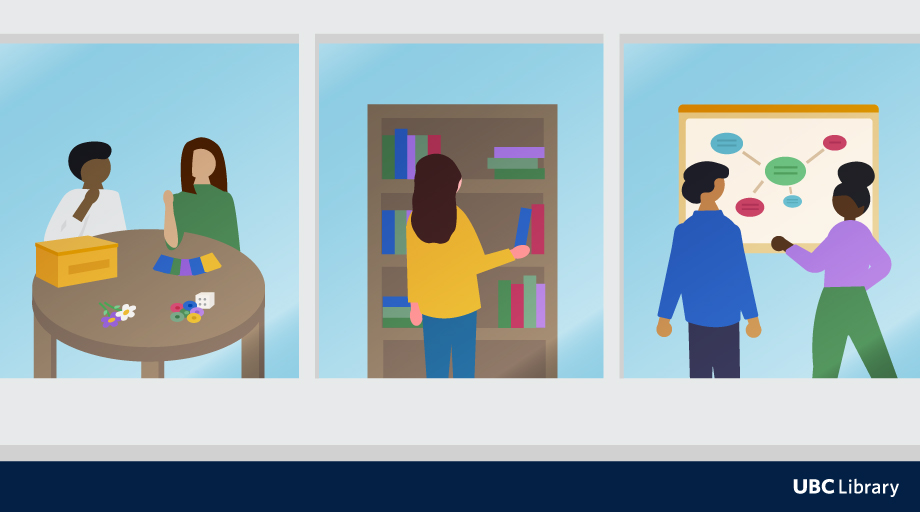
“We started volunteering ourselves as a community partner four years ago, and every year we’ve had interest from teacher candidates,” says Emily Fornwald, Education Librarian at UBC Education Library and Bachelor of Education trained teacher.
Community Field Experience (CFE) is a unique course within the UBC Bachelor of Education program. Over the course of three-weeks, teacher candidates who have finished their school-based practicums can be placed with a community partner to broaden their pedagogical horizons. Community partners include alternative learning sites like museums, international schools, camps and—for the last four years—UBC Education Library.
A taste of library life
“The CFE program is an opportunity for post-practicum teacher candidates to explore non-traditional educational spaces. It’s a chance for them to apply their learning as new teachers outside of a traditional K-to-12 classroom,” says Fornwald, who is the primary point of contact for CFE students placed at the Education Library.
Teacher candidates work directly with the librarians to develop projects that align with ongoing initiatives at the branch and that can tie into their future work as teachers. These projects also benefit the library, as the research and other materials produced by CFE students are often incorporated into new library resources down the line.
“One of the things that we did this year, based on CFE work done last year, is a Story Workshop Kit for our collection. Crafting supplies and loose parts are brought together to support a program for early learners called Story Workshop,” says Fornwald.
For young students who can’t yet read or write, the kit provides a tactile way for them way to respond to the story. The Story Workshop Kit is now available to borrow through the UBC Library catalogue.
New addition to UBC Library’s Critical Literacy Kits
“This year, one of our CFE students was excited by the new work we’re trying to do around disability representation in the collection,” says Fornwald. “We have a faculty member who is in charge of an exceptionalities course, and she was curious about how much our picture book collection represents characters—both fictional or non-fictional people—with disabilities.”
For her community field experience, Iva Mills took on the task, completing a literature review and annotated bibliography about disability representation in children’s literature, and exploring the Education Library’s collection to find books that include characters with disabilities. She also looked at critical literacy kits the library had previously created as part of the Indigenous Children’s Books and Critical Literacy (ICBCL) project, and which cover topics like cultural appropriation, myth and folklore, and residential schools. Mills’ work will be used by librarians at the Education Library to create new resources to support critical literacy, this time with a focus on disability representation in children’s picture books.
“Prior to getting into the Bachelor of Education program, I did a SSA (Student and School Assistants) program to have training to work with children with disabilities. So the moment that I found out that [this project] catered to that, I thought, this is something I’m passionate about,” says Mills, who now teaches in the Vancouver School District (SD39). “It was awesome to be part of a project that was actually so connected, so relevant, and so helpful to what I’m doing now as a teacher.”
Keeping lesson planning guides relevant with new research
As part of his community field experience, Haynam Leung explored English Language learning (ELL) resources within the Education Library’s collection.
“Because my teaching areas are business education and ELL, I was asked to find resources [in those areas] and also recommend some books [to add] to the Education Library’s collection,” says Leung.
“He helped us look at our lesson planning guides and add more resources specifically to support English language learners,” says Fornwald.
With an interest in emerging technologies, Leung also did research on generative AI tools, like the AI-powered language model ChatGPT. He set out to find resources for teachers who want to learn more about AI and how these tools can be used in the classroom. He also dug into some of the online discussions around the ethics of Generative AI in education: “Basically, I looked at some of the ethical issues with AI,” says Leung, and how educators can prevent these issues in the classroom, like student cheating.
For any future CFE students looking for placements, Leung’s advice is to ask around. Look at the types of projects previously produced at community partners, and make sure the work matches your own professional interests.
Leung, who now teaches in the Richmond School District (SD38), says that the Education Library was one of his top placement choices. “I really appreciated how friendly all the staff in the Education Library were. Even though I was just there for three weeks, they treated me like a member of staff. The environment of the library was just fantastic.”